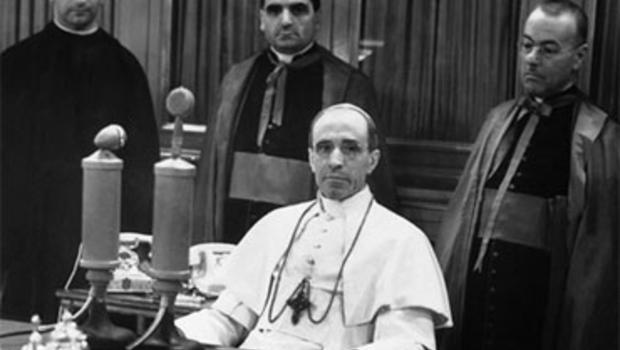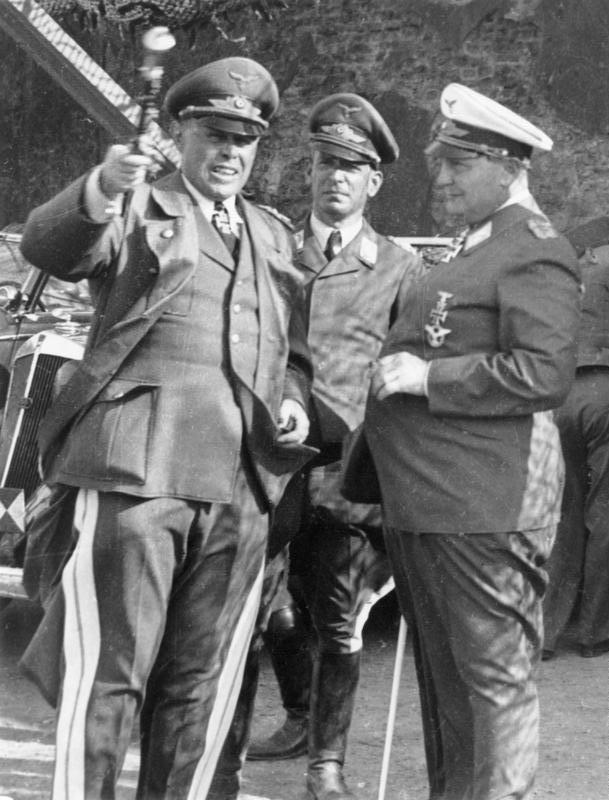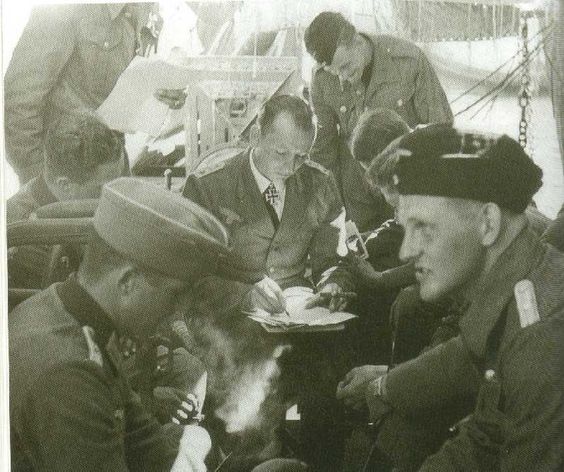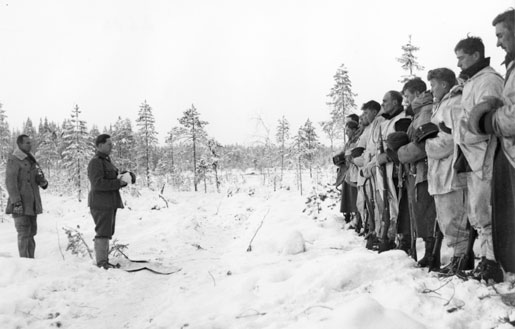Thursday 29 February 1940
 |
| Finnish soldiers circa 29 February 1940. |
Soviets also attack at Taipale for the second day in a row, but all three attacks are repelled. The Soviets begin to lose interest in this extremely difficult sector.
There also is a Soviet attack at Pitkaerantae, Northeast of Lake Ladoga, but it also is repelled.
The Finns overrun another motti north of Lake Ladoga. This time, it is East Lemetti Motti (West Lemetti Motti having already fallen). The Finns capture 5 field guns, 1 antitank gun, 71 tanks, 12 armored cars, 6 antiaircraft machineguns, 206 trucks & 70 machineguns.
Winter War Peace Talks: One day before the Soviet deadline, the Finns accept the Soviet terms in principle and they are willing to enter into final negotiations about them. They do not communicate this to the Soviets immediately because of negative French and British reactions to the news.
The Winter War proceeds, but it is on its last legs.
Battle of the Atlantic: Shipping Losses for February 1940:
- 63 Allied Ships
- 226,920 tons
- 4 U-boats sunk.
In the Dutch West Indies, the destroyer HMS Despatch intercepts the German blockade runner Troja near Aruba. The crew of Troja scuttles the ship lest it is captured, and it sinks on 1 March. Fellow blockade runner Heidelberg, which departs at roughly the same time after dark, evades detection.
The British at Gibraltar detain the US freighter Cold Harbor.
Convoy OA 101 departs from Southend. Convoy OB 101 departs from Liverpool.
Spies: The Uruguayan Government sells the wreck of the Graf Spee in the River Platte to a local salvage firm for £14,000. The salvage firm, in fact, is a front for British naval intelligence, which wishes to learn any secrets they can find about, for instance, Kriegsmarine radar. The Admiralty thinks its local representatives paid too much, but useful information is learned about the radar.
British/Japanese Relations: The British return 9 of the 21 German nationals that they abducted from the Asama Maru on 21 January 1940. In exchange, the Japanese agree not to transport German military reservists back to Germany.
German Government: With Undersecretary of State Sumner Welles making the rounds of European leaders, there is a widespread concern throughout Europe about what his meddling in European affairs may portend. Hitler, in particular, is concerned. He instructs everyone who is to meet with Welles that they are to stick to the proper narrative: Britain and France declared war so that they could destroy Germany, and thus Germany must continue defending itself until they stop.
The British have reinstated the Navicert system used during World War I, which basically clears shipped goods as not being contraband in advance. It also is championed by President Roosevelt, but merchants are not as keen about it. The US and other neutral powers are following this system with varying degrees of enthusiasm and compliance. The German Press Department at The Hague issues a statement that anyone adhering to this system will make themselves suspect to Germany.
Estonia: The government forbids its ships to travel in the North Sea except by convoy.
Palestine: There is a spontaneous protest against the British at the recent laws restricting the purchase of land, which many settlers feel is an improper penalty upon Jews.
French Homefront: Minister of Finance Paul Reynaud warns in a broadcast about runaway inflation (le cycle infernal). The words carry weight because of the fairly recent disaster on that score in Weimar Germany. The government is imposing the usual measures to control prices, many of which stretch back to Roman times, including a price freeze, rationing, revaluation of gold reserves, and compulsory use of female labor.
In the first step of the plan, the French government introduces ration cards.
 |
| Vivien Leigh accepts her award for Best Actress in "Gone With The Wind," 29 February 1940. |
Judy Garland receives a special Academy Award (Best Juvenile Actress) for "The Wizard of Oz." It is one of the few awards of the night not given to cast or crew of "Gone With The Wind."
GWTW, of course, wins Best Picture, and its Director Victor Fleming also wins (he took over partway through). Among the winners, Hattie McDaniel of GWTW becomes the first African American winner as Best Supporting Actress for her portrayal of Mammy. Perhaps the only mild upset of the evening is Clark Gable's failure to win Best Actor. It is won instead by Robert Donat against a sterling field that includes Jimmy Stewart for "Mr. Smith Goes to Washington," Mickey Rooney for "Babes In Arms," and Laurence Olivier for "Wuthering Heights." Every nominee for Best Actor would be serving in the military within about three years - except winner Donat, who was too old and sickly.
 |
| Jan/Feb 1940, l. to r. Antilla, Troja, and Heidelberg anchored at Malmok, source: Les Seekins’ scrapbook, courtesy of www.lago-colony.com. |
February 1940
February 3, 1940: Soviets Capture a BunkerFebruary 4, 1940: Peace Talks in Stockholm
February 5, 1940: Allies to Invade Norway
February 6, 1940: Careless Talk Costs Lives
February 7, 1940: IRA Terrorists Executed
February 8, 1940: Spies!
February 9, 1940: The Welles Mission
February 10, 1940: Confiscation of Jewish Goods
February 11, 1940: Soviets Attack Mannerheim Line
February 12, 1940: Breaches In Mannerheim Line
February 13, 1940: Soviets Inching Forward in Finland
February 14, 1940: Soviets Batter Mannerheim Line
February 15, 1940: Finns Retreat
February 16, 1940: Altmark Incident
February 17, 1940: Manstein and Hitler Discuss Fall Gelb
February 18, 1940: Operation Nordmark
February 19, 1940: King Gustav Says No
February 20, 1940: Falkenhorst Commands Weserubung
February 21, 1940: Radar Advances
February 22, 1940: Friendly Fire
February 23, 1940: Soviets Present Their Demands
February 24, 1940: Fall Gelb Revised
February 25, 1940: Mr. Welles Comes to Visit
February 26, 1940: Battle of Honkaniemi
February 27, 1940: Finns Retreat Again
February 28, 1940: Overseas Volunteers Help Finland
February 29, 1940: Finns Accept Soviet Terms In Principle
March 1940
March 1, 1940: Soviet Breakthroughs Past ViipuriMarch 2, 1940: Soviets Swarm West in Finland
March 3, 1940: Soviets Across Gulf of Viipuri
March 4, 1940: USSR Apologizes to Sweden
March 5, 1940: Katyn Forest Massacre Approved
March 6, 1940: Finns Head to Moscow
March 7, 1940: The Coal Ships Affair
March 8, 1940: Peace Talks Begin in Moscow
March 9, 1940: Soviets Harden Peace Terms
March 10, 1940: Germany Draws Closer to Italy
March 11, 1940: Winter War Peace Terms Finalized
March 12, 1940: War is Over (If You Want It)
March 13, 1940: Winter War Ends
March 14, 1940: Evacuating Karelia
March 15, 1940: The Bletchley Bombe
March 16, 1940: First British Civilian Killed
March 17, 1940: Enter Dr. Todt
March 18, 1940: Mussolini To Join the War
March 19, 1940: Daladier Resigns
March 20, 1940: Soviets Occupy Hango Naval Base
March 21, 1940: Paul Reynaud Leads France
March 22, 1940: Night Fighters Arise!
March 24, 1940: French Consider Alternatives
March 25, 1940: Reynaud Proposes Action
March 26, 1940: C-46 First Flight
March 27, 1940: Himmler Authorizes Auschwitz Construction
March 28, 1940: Allies Ponder Invading Norway
March 29, 1940: Soviets Prefer Neutrality
March 30, 1940: Allied Uncertainty
March 31, 1940: The Tiger Cage
2019











